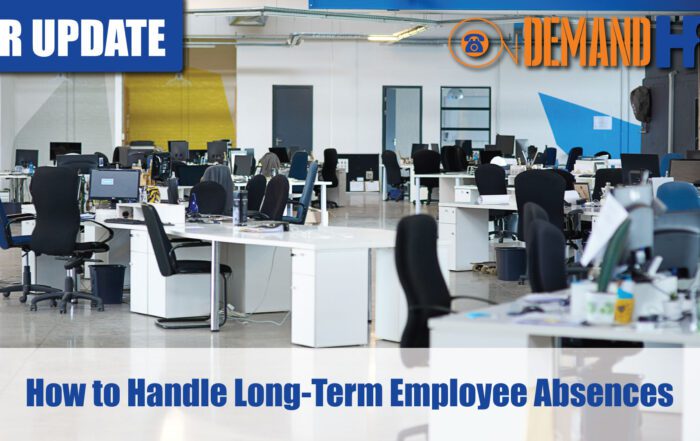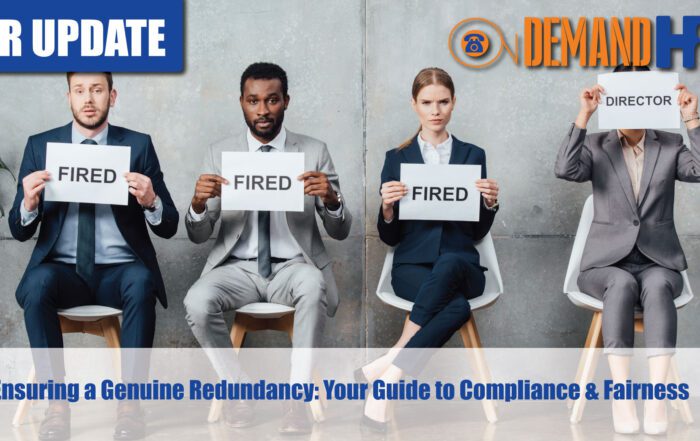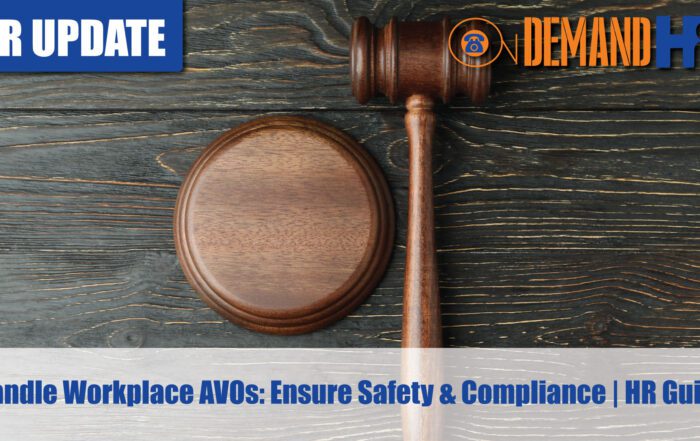Responding to Union Claims in EBA Negotiations
In episode 10 of HR Friday’s Clint gives an overview of the types of monetary and non-monetary claims you may receive from unions in an enterprise agreement negotiation, and how to make good business decisions on these matters.
Please see below for a full transcript of the video
Share the HR or workplace relations challenge facing your business and one of our experienced consultants will be in touch within 24 hours with a strategic action plan or discover the best strategy yourself by accessing out free online training library.
Transcript
Clint Indrele 0:15
Good morning. Welcome to another edition of HR Fridays. My name is Clint Indrele Managing Director of On Demand HR. Today is Friday the 13th of November 2020. Apologize for last week, I had an unexpected baby much earlier than we were anticipating. So she’s doing very, very well. Thanks very much for your patience and had Andrew Koleda filling in for me just talking through what we’ve got planned ahead with HR Fridays.
Clint Indrele 0:44
Each week we will have a specific topic of interest in the workplace relations, HR or recruitment space, or investigations or business representation space. Let us know any future topics of interest you would like me to present on, please put any thoughts on today’s presentation in the comments and I’m happy to interact with you about any questions you may have.
Clint Indrele 1:07
The whole purpose of HR Fridays each week is to try and provide business, our other professional advisors and associate members advice which is reality. We’ve been in the Fair Work Commission many times we’ve done many investigations, we’ve dealt with a Fair Work Ombudsman we’ve dealt with other government bodies, we can provide real perspective on your workplace relations affairs, not just theory and scare tactics like some others do. www.ondemandhr.com.au.
Clint Indrele 1:33
Today’s topic is going to be enterprise bargaining we’re going to continue on with that you might recall last session I spoke about planning for an enterprise agreement. Today I want to talk about the sorts of logs of claims or union claims that you might get in an enterprise agreement and kind of some of the considerations that you might want to think about when talking through those things. So I’m going to break this down into two sections, monetary claims, and non monetary claims. We can talk about what each types of claims mean, and the sort of things to think about when you’re considering these sorts of claims. Okay, so already spoke about in the previous session to make sure that you take time, make sure that you consider the claims, cost the claims, and so on and so forth. This is more getting to the substance of each of the claims and what you should be thinking about in the background. So let’s let’s get started.
Clint Indrele 2:25
So first of all the types of claims that we’ve seen, I’m going to reflect on a few recent EBA’s that we’ve been negotiating on this front, and some of the observations of recent claims that unions are putting forward.
Clint Indrele 2:37
So that the first claim that we get from time to time is that and this is in the monetary section is the parody of wages over time. So what you’ll often find in an EBA situation is that you might have some employees that are at higher rates than others. And that may be a product of them either being paid above the previous EBA rates, or it may be some sort of historical issue as to why they’re being paid higher. So what you sometimes get is these claims that well, this person’s getting this rate, so let’s move everyone else up to the highest common denominator. And whilst that might, you know, sound like a moral, morally good cause and whilst that mindset might sound great, in theory, this is sort of a an inadvertent way of creating hidden costs for the business when you’re considering an enterprise agreement. So the parody of wages argument is one that needs to be looked at very closely before you make any commitments to those sorts of arrangements. Certainly nothing wrong with phasing out rates over time or, you know, grandfathering rates over time. And those sorts of things are a good way of bringing high rates back to parody. But in terms of arguments around increasing the lower rates, to meet the top rates that individuals might be getting in a workplace or in a section of the workplace, that can be something that you need to look at very, very closely.
Clint Indrele 3:57
Let’s also talk about I mean, at the moment, you’ve got a situation where still, obviously wage increases are being sought in EBA’s, understandably, and the backdating of those increases. So I think that what we’re seeing at the moment is unions understand that, obviously, the wage increases that they can seek at this particular time in 2020, are probably lower than you would normally seek in a normal environment. So that is, I think that’s been recognized in certainly something the enterprise agreement processes that we’ve been involved in, but then you’ve also got the requests to kind of backdate increases. And look, some of those requests might have merit and some of them might not. But the one thing I do say about that backdating increases is you want to create the incentive there for the other side to resolve the enterprise agreement negotiations in a timely manner. By giving a kind of unconditional guarantee that you’re going to backdate increases it doesn’t really create an environment where the parties are motivated towards bringing the EBA to conclusion. So, again, we would suggest that if there’s going to be a backdating of increases, it should only be done later on in the piece. And it should be done conditional upon something being delivered by potentially the Union and the employees voting on the agreement. So certainly something to think about in regard to that.
Clint Indrele 5:16
We’ve seen recently in in a warehousing environment, we’ve seen requests for allowances for things like forklift allowances, those are typically not actually outlined in the award. So these are kind of additional things that you might see as being claimed for certain allowances in the enterprise agreement. We see requests for things like and this is across a variety of industries, Team Leader allowances, supervisor allowances, or even second in charge allowances. Again, this is a way of kind of increasing wages without actually asking for higher percentage increases in the headline, yearly wage increases. So sometimes these things can actually add a fair degree of cost. So that should be carefully considered when obviously, you’re going through the costing process.
Clint Indrele 6:03
Paid domestic violence leave is another one that we’ve seen come up, to be honest, I mean, this this has been introduced as a concept for the past couple of years now, it’s been something that’s been an unpaid entitlement under the Fair Work Act. And and it’s not something that we’ve seen that’s been used a hell of a lot, the unpaid entitlement. Now, if it were paid entitlement, would there be more use of it potentially, this is the sort of claim that, you know, you might think about, it depends on the circumstances, of course, the other option is to obviously allow a person to use personal leave in these situations and look, a lot of domestic violence situations end up being personal leave situations anyway, through either physical or physical or kind of mental health issues or caring for a person in the immediate Family or Household. So those things I do see going somewhat hand in hand. So that is, that is one way of dealing with requests, or claims in respect to paid domestic violence leave.
Clint Indrele 7:02
The other one we see commonly is improved redundancy provisions. And this has been something in particular has been coming up a lot this year, because of the prospect of redundancy. Again, we see everything from redundancy scales, which are you know, good, bad, and indifferent, we see some that, you know, historically very, very high compared to the NES, we see some that are either exactly the NES or slightly above the NES. Again, this is a typical sort of claim that we’re seeing commonly come up in recent EBA negotiations.
Clint Indrele 7:34
Another one we see is bonus structures inside the EBA, what we see is a request from unions to put some sort of bonus structure or reward structure inside the EBA, subject to a fairly prescriptive criteria. To be honest, this is not something I’m a big fan of considering it might sound great in theory, but in practical, what you end up doing by putting it in the enterprise agreement is losing the discretion around how bonuses can be awarded, and what types of things or what types of behaviors or performance can be rewarded. And it ends up in the long run being just an additional payment without, you know, a whole great condition attached to it. So again, it’s probably something I would resist in an enterprise agreement. Nothing wrong with paying bonuses, but I think those should be discretionary. I think those those bonus style arrangements and the objectives to achieve those bonuses should be reviewed from year to year. So again, I’d probably suggest to organizations that are looking at an enterprise agreement to avoid putting bonus structures inside the EBA.
Clint Indrele 8:36
Another request we see often is for paid breaks so paid breaks under most modern awards, it’s generally a 30 minute to 60 minute unpaid break. And so one way of obviously, achieving greater amount of pay for employees in the award is to request paid breaks. Now that might be practical in some situations that might be justified in some situations. There are two things to consider on on that particular condition, though. One is, will that create an overtime situation at the back end of the day. So if a person works seven and a half hours with an unpaid 30 minute meal break, now all of a sudden that break is paid. You know, is that going to be an eight hour shift with an overtime potentially an overtime consideration at the end of it? Or are they going to be alternative provisions in the enterprise agreement to deal with that, that that position of the paid beak? So again, that’s some that’s something to consider very closely. In terms of the payment for payables, should I say for paid breaks once again, the second thing to think about as well is the rostering structures, how that’s going to work. Is there a justification for the paid break or not having regard to the work being done? If a person’s remaining on site or having to remain on site or having to remain on call it there could be more justified justification for that type of request than one that where there’s no there’s none of those conditions attached.
Clint Indrele 10:00
The last but not least, another one we’ve seen is a request for payment for professional development. So that’s the cost of the training and also the time it takes to complete the training. So we’ve seen that creep into a couple of Enterprise Agreement claims, and those have been ones that our clients have been considering. So that’s a bit about monetary claims, the sorts of claims you might get how you might respond to them, again, www.ondemandhr.com.au if you want to talk about those things in more detail how you might respond to a particular request from the union in any Enterprise Agreement you’re undertaking.
Clint Indrele 10:33
Let’s move forward now to the non monetary claims. So some of the things we’ve seen this year have been things like a request not to use surveillance, except in situations of theft and safety breaches. And I see a lot of companies get really flustered about this, they get flustered about, we’re only going to use surveillance, if it’s a security issue. Or if it’s, you know, something that we have to examine for the purposes of, you know, reporting something to the police, or so on and so forth. I don’t know why businesses get so worried about using surveillance, if used properly, surveillance is completely legitimate and can be used for a range of reasons, including, you know, dealing with performance issues from employees. So, again, there are requirements around surveillance that come from the relevant legislation, which we can talk about another day, we won’t spend that today. But again, trying to limit the use of surveillance in the enterprise agreement is something that we typically would tell a client to resist. And you certainly want flexibility about how you deal with those things. And that should be dealt with in your in your policies and procedures of the company. In terms of safety process, we see sometimes requests for improved safety processes or safety standards. Another one of a more important one we see is the disciplinary policy. So what we see often requested is putting a disciplinary policy in the enterprise agreement, we again would would tell most of our clients to resist that, because what often happens is they try and by putting an enterprise agreement in the enterprise agreement, disciplinary processes, the Union and the employees may try to limit the the discretion, that the business has to deal with performance issues, to try and push it through some sort of very long winded process before you get to a potential termination outcome or something along those lines. So again, that is something that we would recommend resisting if possible. In those situations.
Clint Indrele 12:26
Sometimes you get requests for how labor higher should be used. So that can be around things like rates, what’s the percentage of labor higher you can use, how quickly there should be converted to ongoing employment. I think some of those things can be looked at in an enterprise agreement, certainly around the rates then, you know, maybe you could have an undertaking that you’re not going to pay anything less than the enterprise agreement rates for casuals that might be a fair reasonable position to put forward. In terms of what percentage of of in terms of what percentage of casuals can be used for labor hire employees can be used. I would resist any claims in respect to that, try and avoid having management decisions being forced upon you by putting those things in the enterprise agreement. The other thing we see is unions requesting that labor hire employees be converted to employees of the company. And, and I don’t have a problem with conversion generally. But I find that a difficult one to accommodate because at the end of the day, there’s no obligation to convert, there can’t be an obligation to convert someone else’s employee to being an employee of your company, unless there is some sort of arrangement between the labor hire company and the business that that’s going to be how it works. And that could trigger some sort of recruitment fee or something like that. So I would probably resist that sort of claim as well. But you certainly could look at things like rates and have some safeguards in there as you know, as a way of dealing with that particular type of claim in response to the union’s request.
Clint Indrele 14:02
The other thing we see often is a lower timeframe for casual conversion, a lot of modern awards talk about a 12 month conversion from casual employment to full time or part time employment, some will request six months and I don’t see a particularly big problem with with that if a casuals been there on a regular systematic basis for you know, six months, then do you really need 12 months to make a decision as to whether or not they’re going to be full time or part time if they’re working regular hours. I’d probably prefer to have some flexible part time provisions in the enterprise agreement if they do become part time. But that aside, and you could certainly make those things conditional you could say well, we’ll give you six months conversion for casuals, but we want flexible part time provisions if we do that. So that’s a that’s a great way of achieving a win win for the business and and the union making that request.
Clint Indrele 14:50
Another one we see is sort of non contact times this is a kind of a childcare related request where they might seek greater amount of time away from children to do certain planning activities, and transition to school types of activities and those sorts of those sorts of things. So that’s another claim we see that comes up in certain EBA’s.
Clint Indrele 15:13
Additional compassionate leave is another one. So at the moment, it’s two days per occasion under the National Employment Standards, and sometimes we see a request to use more than that, or that, that that entitlement to be extended. So again, one way you can look at that is consider personal leave whether personal leave can be added beyond the use of compassionate leave for those types of situations. Again, bearing in mind that a lot of compassionate leave situations could be otherwise defined as personal leave situations anyway, or carers leave situations anyway. So, again, something to consider it on that front
Clint Indrele 15:50
In terms of, one thing we do see is his claims around union rights. So we see things around claims like, and this has been many negotiations about over many years, you know, requests for companies to train union delegates to facilitate union deductions. And sometimes you see requests for you know, notice boards and things like that. In terms of the deductions, I think that’s, you know, fair and reasonable. I don’t see any great reason why you wouldn’t want to do that. Certainly through the payroll, it’s fair and reasonable to make those deductions and remit that to the to the union and just sort of just shows a level of cooperation in the in the negotiations, I’m not sure why resisting that is going to be of any upside to an organization. In terms of training of delegates. I think that’s okay, to some extent. But, again, I think it I think it should have limits. You’ve got yourself will have any training, how many training days are really required for a union delegate to come in and do their job in a relatively small workplace? And, and not only that, you’ve got to consider that there is going to be the external support of the Union for those employees. So I think that maybe a couple of days a year is okay. But then anything beyond that might be, you know, might be really pushing it and might not be necessary.
Clint Indrele 17:06
The last point, I just want to raise around the term of the agreement, we’ve seen mixed kind of, mixed messages around this. So we’ve got some unions are looking at this saying, Okay, well, let’s try and lock in a four year deal at a reasonably good rate, because we think that the next couple of years is going to be very, very uncertain. And we think that you’re getting a solid deal for 4 years is good. And now rather than the unknown of what might happen, it might happen in a year, or 18 months, particularly if businesses hit the wall with, you know, long periods of downtime trading, and particularly if, JobKeeper comes up in March 2021, which is going to. The other option is to seek a shorter period of agreement where you seek a one year deal or a two year deal, and then revisit the whole issue of pay increases at that time. So I think there’s arguments for and against that, depends what industry you’re in depends what sort of situation that businesses in. And I think there’s also arguments for and against on the union side as well. So that’s, that’s a very interesting one, and not one that I can give us a straight answer to or a simple answer to, in particular.
Clint Indrele 18:09
So yeah, so that’s it. That’s just an overview of again, some non monetary claim that you’re likely to, to get in an enterprise agreement and some of the ones that we have seen recently. That’s basically it for today. So I hope you’ve enjoyed this session on monetary and nonmonetary logs of claims in an enterprise agreement.
Clint Indrele 18:30
If you’ve got any questions about the session, please reach out to us at www.ondemandhr.com.au We are experienced Enterprise Agreement negotiators. We’ve got a number of enterprise agreements that we’ve negotiated this year. We’ve got some that are currently underway. If you’ve got any questions, feel free to leave it in the chat box and we’ll be happy to revert back to you with some some thoughts and comments on how you should approach the situation but from Clint Indrele, Managing Director of On Demand HR, it’s goodbye for now and have a wonderful weekend.






